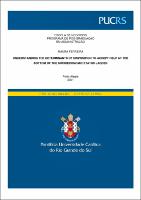| Share record |


|
Please use this identifier to cite or link to this item:
https://tede2.pucrs.br/tede2/handle/tede/9572| Document type: | Tese |
| Title: | Understanding the determinants of disposition to accept help at the bottom of the socioeconomic status ladder |
| Author: | Ferreira, Maura |
| Advisor: | Sampaio, Cláudio Hoffmann |
| Abstract (native): | Prosocial consumer behavior research devotes great attention to donors/helpers but seems to overlook recipients of help. Moreover, socioeconomic status (SES) literature focuses on the effects of lower SES on prosocial behavior, but not on how this status influences disposition to accept help, yet lower SES consumers, who experience financial and social constraints, are commonly recipients of help. This dissertation aims to address these two gaps with two essays that suggest and investigate why and when lower SES consumers’ disposition to accept help varies. The first essay shows results from a systematic literature review to support the idea that recipients of help are often ignored in consumer behavior literature, especially in studies devoted to prosocial consumer behavior. Then, drawing from social psychology literature, theoretical propositions relative to why and when lower SES consumers may accept less or more help are suggested. The second essay investigates the effect of helpers on disposition to accept help among lower (vs. higher) SES consumers. Results from three experimental studies (N = 887) reveal that who the helper is (i.e., a close or a distant helper) affects disposition to accept help among lower SES consumers but not among their higher SES counterparts – lower SES consumers accept less help from a distant (vs. close) helper, this effect is suggested by one of the propositions presented in the first essay. This dissertation advances prosocial consumer behavior literature by exploring disposition to accept help among potential recipients of help. By understanding what encourages donors/helpers to help and recipients to accept help, prosocial relationships become more effective. Moreover, the dissertation contributes to that literature as it suggests and investigates why and when disposition to accept help among lower SES consumers varies. Limited attention has been devoted to this topic, even though there are real-world evidence indicating that lower SES consumers may turn down available help. |
| Abstract (english): | Pesquisas em comportamento prosocial do consumidor focam em consumidores que oferecem ajuda, mas tendem a ignorar potenciais beneficiários da ajuda oferecida. Ainda, a literatura em status socioeconômico (SES) se concentra no comportamento prosocial de consumidores de SES mais baixo, mas não em como este status pode influenciar a disposição destes consumidores a aceitarem ajuda oferecida gratuitamente, mesmo sendo estas pessoas potenciais recipientes de ajuda. O objetivo desta tese é o de endereçar estas duas lacunas por meio de dois artigos que sugerem e investigam os fatores que influenciam a disposição de consumidores de status socioeconômico mais baixo em aceitar ajuda. O primeiro artigo apresenta resultados de uma revisão sistemática da literatura que suporta a ideia de que recipientes de ajuda são geralmente ignorados em estudos em comportamento prosocial do consumidor e sugere proposições teóricas, respaldadas pela literatura na área de psicologia social, sobre os motivos e quando consumidores de SES mais baixo tendem a aceitar mais ou menos ajuda. O segundo artigo testa empiricamente uma das proposições sugeridas no primeiro artigo - o efeito de quem oferece ajuda na disposição de consumidores de baixo (vs. alto) SES aceitarem ajuda. Resultados de três estudos experimentais (N = 887) revelam que quem oferece ajuda (i.e., se alguém psicologicamente distante ou próximo do potencial beneficiário) afeta a disposição em aceitar ajuda entre consumidores de SES mais baixo, mas não entre aqueles com SES mais elevado – consumidores de baixo SES aceitam menos ajuda de alguém visto como distante (vs. próximo) a eles. Ao se compreender tanto o que encoraja doadores a ajudar quanto potenciais beneficiários a aceitarem ajuda, é possível promover relações prosociais mais efetivas. |
| Keywords: | Prosocial Consumer Behavior Recipient of Help Help Socioeconomic Status Comportamento Prosocial do Consumidor Recipientes de Ajuda Ajuda Status Socioeconômico |
| CNPQ Knowledge Areas: | CIENCIAS SOCIAIS APLICADAS::ADMINISTRACAO |
| Language: | eng |
| Country: | Brasil |
| Publisher: | Pontifícia Universidade Católica do Rio Grande do Sul |
| Institution Acronym: | PUCRS |
| Department: | Escola de Negócios |
| Program: | Programa de Pós-Graduação em Administração e Negócios |
| Access type: | Acesso Aberto |
| Fulltext access restriction: | Trabalho não apresenta restrição para publicação |
| URI: | http://tede2.pucrs.br/tede2/handle/tede/9572 |
| Issue Date: | 29-Mar-2021 |
| Appears in Collections: | Programa de Pós-Graduação em Administração e Negócios |
Files in This Item:
| File | Description | Size | Format | |
|---|---|---|---|---|
| MAURA_FERREIRA_TES.pdf | MAURA_FERREIRA_TES | 1.07 MB | Adobe PDF |  Download/Open Preview |
Items in DSpace are protected by copyright, with all rights reserved, unless otherwise indicated.




